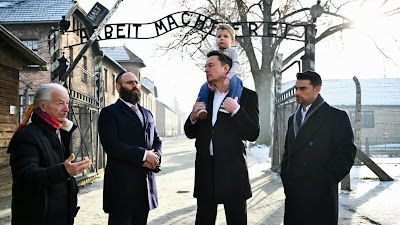A Connecticut Yankee Counterfactual at Auschwitz: On Elon Musk's Holocaust "What Ifs"
I was happy to contribute some thoughts to Shira Li Bartov's new article in The Forward, "Could Social Media Really Have Stopped the Holocaust?" which addresses Elon Musk's use of counterfactuals to reflect on the legacy of the Holocaust. See article LINK
Here are my full comments, some of which appear verbatim in the article, which also quotes leading Holocaust scholars and Jewish historians like Christopher Browning, Doris Bergen, and David Myers.
When Musk visited Auschwitz the other day, he was reported as saying that "[if] there [had] been social media at the time of World War II, the Holocaust 'would have been impossible to hide' and lives could have been saved."
As I noted:
Musk’s comments are the latest examples of how people often use counterfactual claims about the past to justify various agendas in the present. By claiming the Holocaust might have been prevented – or its deadly effects mitigated – had social media existed in the 1930s and 1940s, Musk is floating a “fantasy scenario” – in which history turns out better thanks to an alteration of some key variable -- in this case, transporting present-day technology in to the past. (This is what I've called a “Connecticut Yankee Counterfactual).
This fantasy is a self-serving one. It enables him to switch the conversation away from his allowing rightwing antisemites to post freely on X – which have increasingly discredited his platform – by claiming it would have served a social good IF – and It’s a big if – it had existed 80 years ago. So his counterfactual is an example of deflection. Maybe he really believes it – in which case he’s not making the claim in bad faith – but it certainly diverts attention away from his actions in the real world of the present.
Finally, Musk’s claim has the advantage of being irrefutable, since it – like all counterfactuals – it is not subject to empirical critique.
There are countless examples of similar claims. Rightwing opponents of gun control have argued that if German Jews had only possessed firearms in Nazi Germany (and if the Nazis hadn’t “supported” gun control) they could have prevented their own persecution. See my blog post from 2013 debunking this claim. See also Donald Trump’s ridiculous claims about Andrew Jackson being able to prevent the Civil War had he only been alive. See also Glenn Beck’s claim (which reversed Musk’s claim that history would have been BETTER if modern technology had existed in the Nazi era) when he said in 2013 that history would have been WORSE (for the Jews) if Hitler had access to the surveillance technology possessed by Pres. Obama.
These kinds of claims often discredit counterfactual reasoning in the eyes of critics – though one should point out people on all wings of the political spectrum employ use it. Sometimes they do it to evade criticism; sometimes to advance criticism – as when journalists attacked the Trump administration for missing opportunities to combat COVID.
Interestingly, as a footnote, the Israel-Hamas War raises a different question about modern technology existing in the past. Given how popular opinion of the current war has been decisively shaped by video footage shot on personal devices, it’s likely that the Allied war against Nazi Germany would have been more difficult to prosecute had there been daily images of German civilian being incinerated in Allied bombing raids. (Some conservatives made this point already in the 1970s in decrying media coverage of the War in Vietnam).
Anyway, the examples are legion, but from my perspective, the key function of Musk’s counterfactual assertion is to rehabilitate his social media platform by investing it with hypothetical virtues – all the while deflecting attention away from its real world liabilities.



Comments
Social media in 1933-1945 is as credible than Hanibal Barca using blimps to cross the Alps. Musk, Trump and Beck are using bad sci fi. That what happens when people "educate on Youtube instead of libraries, college and university.